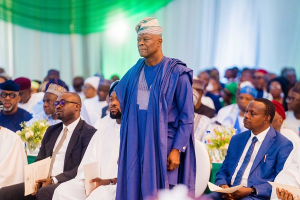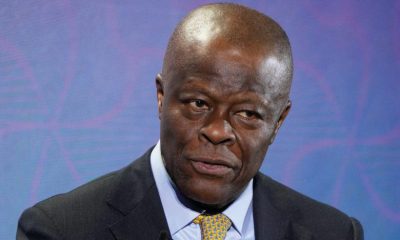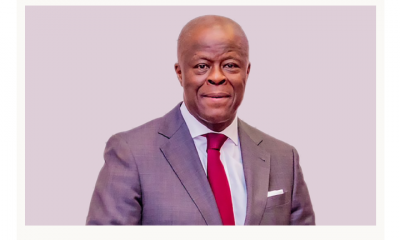Business
Wale Edun: FG To Curb Rising Inflation With ‘Cut In Money Supply

Wale Edun: FG To Curb Rising Inflation With ‘Cut In Money Supply
The Federal Government plans to cut the cash in circulation to rein in inflation, Minister of Finance and Coordinating Minister for the Economy (CME), Mr. Wale Edun, hinted.
He said the measure became imperative to keep rising inflation at a desirable and stable level.
Edun, who was inaugurated on Monday as a minister, spoke in Abuja while chairing the Federation Account Allocation Committee (FAAC) meeting.
“There should be discipline in money supply to control inflation in the nation’s economy,” the minister told FAAC members.
By emphasizing discipline in money supply, the CME Finance minister is referring to the need to carefully regulate the creation and circulation of money in the economy.
On the monetary side, it involves controlling the growth of the money supply through various measures, such as adjusting interest rates, open market operations, or setting reserve requirements for banks.
On the Fiscal side, caution will be required on how the federal, state, and local governments disburse money.
By maintaining discipline in the money supply, the government aims to keep inflation within a target range that is conducive to stable economic growth and price stability.
Ultimately, the objective is to strike a balance between ensuring adequate money supply to support economic growth and preventing excessive inflation that can erode the value of currency and cause economic instability.
The finance minister also noted that there was a need for government to mobilize resources to deliver on its mandate to increase employment and reduce poverty.
The FAAC agreed to share N966.11 billion as federal allocation to the three tiers of government last month.
The amount was shared from total gross revenue of N1.746 trillion.
The total revenue was made up of statutory revenue of N397.42 billion; Value Added Tax (VAT) revenue of N271.95 billion; Electronic Money Transfer Levy (EMTL) revenue of N12.84 billion and Exchange Difference revenue of N283.9 billion.
For last month, the total deductions for the cost of collection came to N62.42 billion, while the total deductions for savings, transfers, refunds, and tax credit cancellation amounted to N717.96 billion.
The Excess Crude Account (ECA) stood at $473,754.57.
A communiqué made available to reporters after the meeting further detailed the distribution of the total distributable revenue.
Of the N966.11 billion, the Federal Government got N374,48 billion, the state (N310.67 billion) and the 774 local government areas went home with N229.41 billion.
Additionally, N51.55 billion was shared among the relevant states as 13 percent derivation revenue.
The gross statutory revenue for the month of July was N1.15 trillion, which was lower than the N1.15 trillion generated in the preceding month (June) by N2.49 billion.
From the available N397.42 billion as statutory revenue, the federal government was given N190.49 billion, the 36 states got N96.62 billion and the councils shared received N74.49 billion.
The oil producing states got N35.82 billion as 13 per cent derivation.
For July, the available gross revenue from VAT was N298,79 billion, which was higher than the N293.41 billion available in June by N5.38 billion.
The federal government received N40.792 billion, the states (N135.97 billion) and councils (N95.18 billion) from the N271.94 billion distributable VAT revenue.
The N12.84 billion EMTL was shared among the federal government, which got N1.93 billion, the state governments, which received N6.42 billion and the local government areas (N4.49 billion).
From the N283.9 billion Exchange Difference revenue, the Federal Government received N141.28 billion, the state governments (N71.66 billion, the councils received N55.245 billion, and N15.72 billion was shared among the relevant states as 13 percent mineral revenue.
The communiqué noted that Imports and Excise Duties, as well as Electronic Money Transfer Levy (EMTL), saw significant increases for last month.
There were notable declines in revenues from VAT, Petroleum Profit Tax (PPT), Companies Income Tax (CIT) and Oil and Gas Royalties.
Bank
Alpha Morgan to Host 19th Economic Review Webinar

Alpha Morgan to Host 19th Economic Review Webinar
In an economy shaped by constant shifts, the edge often belongs to those with the right information.
On Wednesday, February 25, 2026, Alpha Morgan Bank will host the 19th edition of its Economic Review Webinar, a high-level thought leadership session designed to equip businesses, investors, and individuals with timely financial and economic insight.
The session, which will hold live on Zoom at 10:00am WAT and will feature economist Bismarck Rewane, who will examine the key signals influencing Nigeria’s economic direction in 2026, including policy trends, market movements, and global developments shaping the local landscape.
With a consistent track record of delivering clarity in uncertain times, the Alpha Morgan Economic Review continues to provide practical context for decision-making in a dynamic environment.
Registration for the 19th Alpha Morgan Economic Review is free and can be completed via https://bit.ly/registeramerseries19
It is a bi-monthly platform that is open to the public and is held virtually.
Visit www.alphamorganbank to know more.
Business
GTBank Launches Quick Airtime Loan at 2.95%

GTBank Launches Quick Airtime Loan at 2.95%
Guaranty Trust Bank Ltd (GTBank), the flagship banking franchise of GTCO Plc, Africa’s leading financial services group, today announced the launch of Quick Airtime Loan, an innovative digital solution that gives customers instant access to airtime when they run out of call credit and have limited funds in their bank accounts, ensuring customers can stay connected when it matters most.
In today’s always-on world, running out of airtime is more than a minor inconvenience. It can mean missed opportunities, disrupted plans, and lost connections, often at the very moment when funds are tight, and options are limited. Quick Airtime Loan was created to solve this problem, offering customers instant access to airtime on credit, directly from their bank. With Quick Airtime Loan, eligible GTBank customers can access from ₦100 and up to ₦10,000 by dialing *737*90#. Available across all major mobile networks in Nigeria, the service will soon expand to include data loans, further strengthening its proposition as a reliable on-demand platform.
For years, the airtime credit market has been dominated by Telcos, where charges for this service are at 15%. GTBank is now changing the narrative by offering a customer-centric, bank-led digital alternative priced at 2.95%. Built on transparency, convenience and affordability, Quick Airtime Loan has the potential to broaden access to airtime, deliver meaningful cost savings for millions of Nigerians, and redefine how financial services show up in everyday life, not just in banking moments.
Commenting on the product launch, Miriam Olusanya, Managing Director of Guaranty Trust Bank Ltd, said: “Quick Airtime Loan reflects GTBank’s continued focus on delivering digital solutions that are relevant, accessible, and built around real customer needs. The solution underscores the power of a connected financial ecosystem, combining GTBank’s digital reach and lending expertise with the capabilities of HabariPay to deliver a smooth, end-to-end experience. By leveraging unique strengths across the Group, we are able to accelerate innovation, strengthen execution, and deliver a more integrated customer experience across all our service channels.”
Importantly, Quick Airtime Loan highlights GTCO’s evolution as a fully diversified financial services group. Leveraging HabariPay’s Squad, the solution reinforces the Group’s ecosystem proposition by bringing together banking, payment technology, and digital channels to deliver intuitive, one-stop experiences for customers.
With this new product launch, Guaranty Trust Bank is extending its legacy of pioneering digital-first solutions that have redefined customer access to financial services across the industry, building on the proven strength of its widely adopted QuickCredit offering and the convenience of the Bank’s iconic *737# USSD Banking platform.
About Guaranty Trust Bank
Guaranty Trust Bank (GTBank) is the flagship banking franchise of GTCO Plc, a leading financial services group with a strong presence across Africa and the United Kingdom. The Bank is widely recognized for its leadership in digital banking, customer experience, and innovative financial solutions that deliver value to individuals, businesses, and communities.
About HabariPay
HabariPay is the payments fintech subsidiary of GTCO Plc, focused on enabling fast, secure, and accessible digital payments for individuals and businesses. By integrating payments and digital technology, HabariPay supports innovative services that make everyday financial interactions simpler and more seamless.
Enquiries:
GTCO
Group Corporate Communication
[email protected]
+234-1-2715227
www.gtcoplc.com
Business
BUA Group, AD Ports Group and MAIR Group Launch Strategic Plan for World-Class Sugar and Agro-Logistics Hub at Khalifa Port

BUA Group, AD Ports Group and MAIR Group Sign MoU to Explore Collaboration in Sugar Refining, Agro-Industrial Development, and Integrated Global Logistics Solutions
Abu Dhabi, UAE – Monday, 16th February 2026
BUA Group, AD Ports Group, and MAIR Group of Abu Dhabi today signed a strategic Memorandum of Understanding (MoU) to explore collaboration in sugar refining, agro-industrial development, and integrated global logistics solutions. The partnership aims to create a world-class platform that strengthens regional food security, supports industrial diversification, and reinforces Abu Dhabi’s position as a hub for trade and manufacturing.
The proposed collaboration will leverage BUA Group’s industrial and logistics expertise, Khalifa Port’s world-class infrastructure, and AD Ports Group’s operational experience. The initiative aligns with the objectives of the UAE Food Security Strategy 2051, which seeks to position the UAE as a global leader in sustainable food production and resilient supply chains. It also aligns with Nigeria’s food production- and export-oriented agricultural transformation agenda, focused on scaling domestic capacity, strengthening value addition, improving post-harvest logistics, and unlocking new markets for Nigerian produce across the Middle East, Asia, and beyond.

Photo Caption: L-R: Kabiru Rabiu, Group Executive Director, BUA Group; Cpt. Mohammed J. Al Shamisi, MD/Group CEO, AD Ports Group; Saif Al Mazrouei, CEO (Ports Cluster) AD Ports Group; Abdul Samad Rabiu, Founder/Executive Chairman, BUA Group; and Steve Green, Group CFO, MAIR Group
Through structured aggregation, processing, storage, and maritime export channels, the partnership is designed to reduce supply chain inefficiencies, enhance traceability and quality standards, and also create a predictable trade corridor between West Africa and the Gulf.
BUA Group—recognised as one of Africa’s largest and most diversified conglomerates, with major investments across sugar refining, food production, flour milling, cement manufacturing, and infrastructure- brings extensive industrial expertise and large-scale operational capability to the venture. MAIR Group will provide strategic support in developing integrated logistics and agro-industrial solutions, creating a seamless platform for production, storage, and distribution.
Abdul Samad Rabiu, Founder and Chairman of BUA Group, said:
“This MoU marks an important milestone in BUA’s international expansion and reflects our long-term vision of building globally competitive industrial platforms. Together with AD Ports Group and MAIR Group, we aim to develop sustainable food production and logistics solutions that strengthen regional supply chains and support the UAE’s Food Security Strategy 2051.”
He further added that, “This partnership represents not just a commercial arrangement but a strategic food corridor anchored on shared economic ambition, resilient infrastructure, and disciplined execution, reinforcing long-term food security objectives for both nations.”
A representative of MAIR Group added:
“This collaboration underscores our commitment to advancing strategic industries in Abu Dhabi and building integrated solutions that reinforce the UAE’s position as a global hub for trade, food security, and industrial excellence.”
A spokesperson from AD Ports Group commented:
“Our partnership with BUA Group and MAIR Group highlights Khalifa Port’s role as a catalyst for high-impact industrial investments. This initiative will enhance regional food security, strengthen global trade connectivity, and support Abu Dhabi’s economic diversification goals.”
This MoU marks a historic collaboration that combines world-class infrastructure, industrial expertise, and strategic vision, setting the stage for a sustainable and resilient food and logistics ecosystem that will benefit the UAE, the region, and global markets alike.
-

 celebrity radar - gossips6 months ago
celebrity radar - gossips6 months agoWhy Babangida’s Hilltop Home Became Nigeria’s Political “Mecca”
-

 society6 months ago
society6 months agoPower is a Loan, Not a Possession: The Sacred Duty of Planting People
-

 society5 months ago
society5 months agoReligion: Africa’s Oldest Weapon of Enslavement and the Forgotten Truth
-

 news6 months ago
news6 months agoTHE APPOINTMENT OF WASIU AYINDE BY THE FEDERAL GOVERNMENT AS AN AMBASSADOR SOUNDS EMBARRASSING









